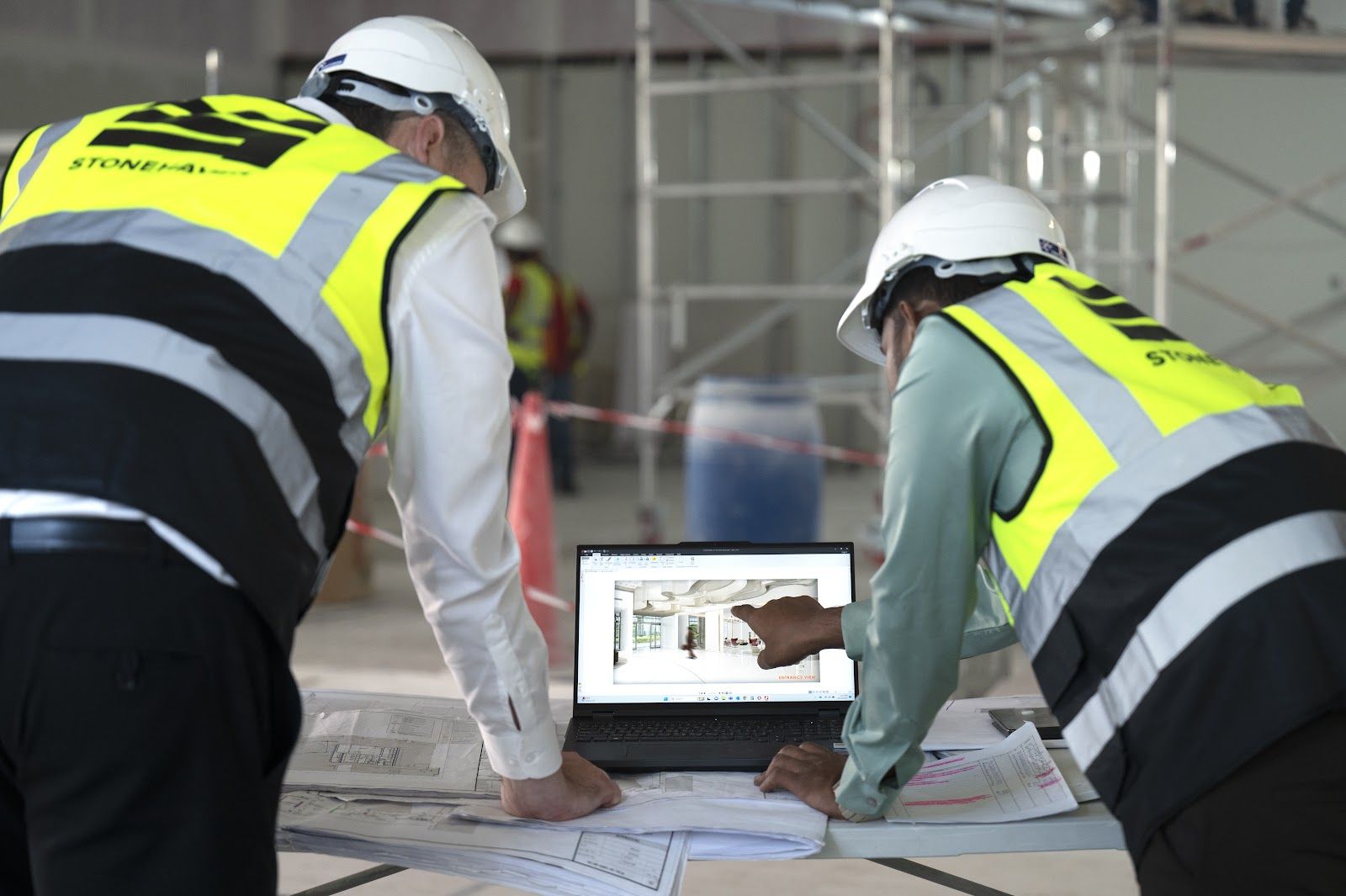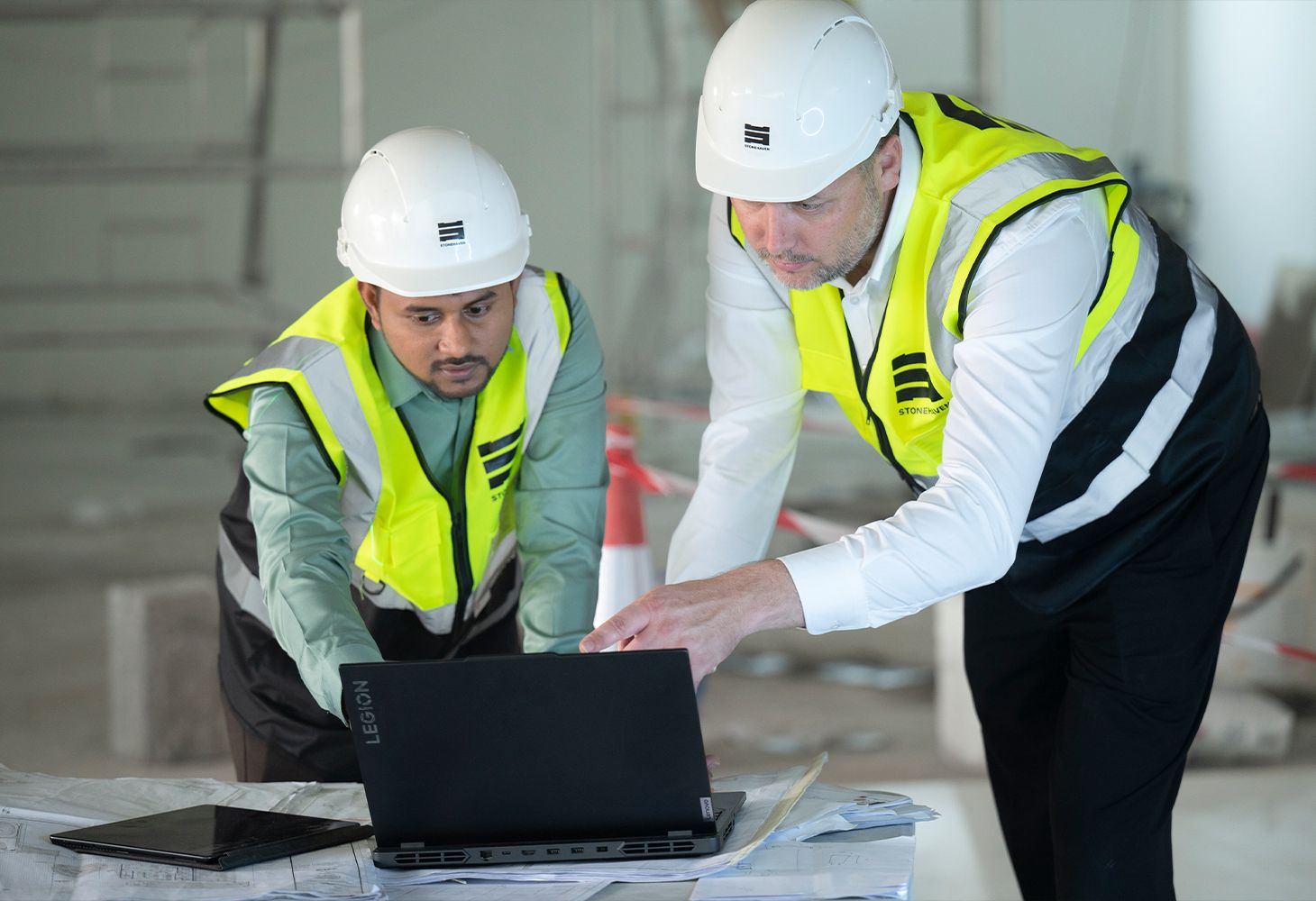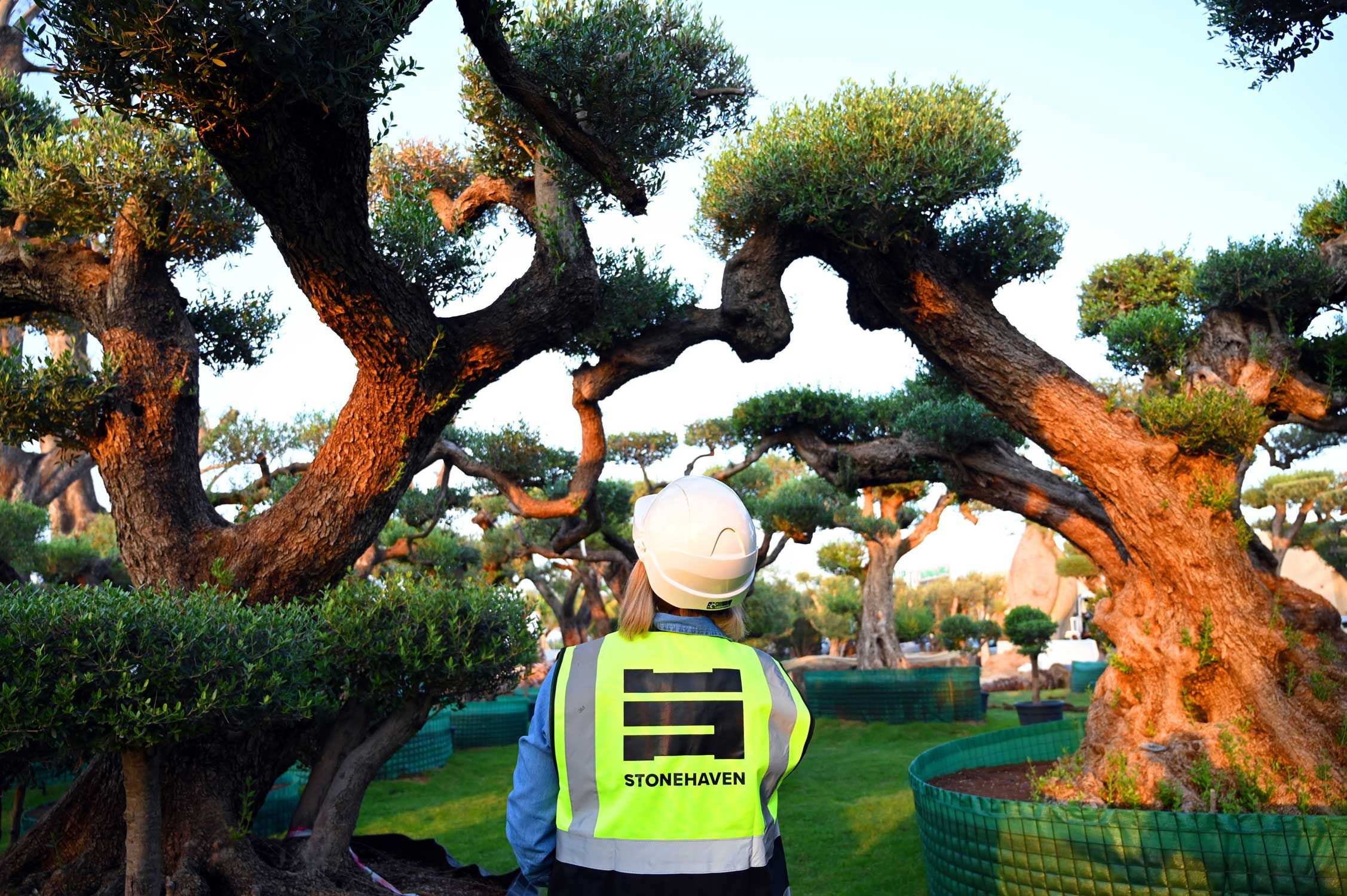The construction of critical infrastructure forms the backbone of economic growth, social progress, and sustainable development. From highways that connect cities to rail systems that drive trade, the need for well-designed and meticulously planned infrastructure is more significant than ever. For road construction companies and infrastructure engineering firms, robust planning and execution directly impact project timelines, budgets, and long-term success. Without careful planning, costs skyrocket, delays become inevitable, and public safety is compromised.
In today’s world, advanced infrastructure projects must balance efficiency, sustainability, and technological innovation. Road and infrastructure engineering consultants play a critical role in achieving this balance, combining design precision, cost control, and risk management to deliver projects that are both resilient and future ready. This blog explores the intricacies of infrastructure planning, the roles of key stakeholders, cost estimation practices, and the immense benefits that meticulous infrastructure planning delivers for road construction and infrastructure projects.
What is Infrastructure Construction?
Infrastructure construction refers to the process of designing, developing, and maintaining essential systems that support public services and economic activity. This includes roads, railways, bridges, airports, energy facilities, and water pipelines. These projects are often large-scale and demand considerable expertise from engineering road construction professionals, planners, and consultants.
Mega infrastructure projects have been pushing UAE’s economic growth by attracting investments, enhancing connectivity and innovation. Improved infrastructure facilitates trade, tourism, and investment, boosting the UAE's GDP. The World Bank estimates that a 1% increase in infrastructure quality can lead to a 0.1% increase in GDP growth which calls the need for expert infrastructure project manager’s to handle them.
Building and infrastructure projects also address utilities like water pipelines, energy grids, and broadband communication systems. These elements are vital to supporting growing urban centres and rural communities alike. Infrastructure construction companies must adopt innovative approaches to meet increasing demand, such as using sustainable construction materials, implementing digital project management tools, and employing cost-effective solutions.
What is the Infrastructure Planning Process?
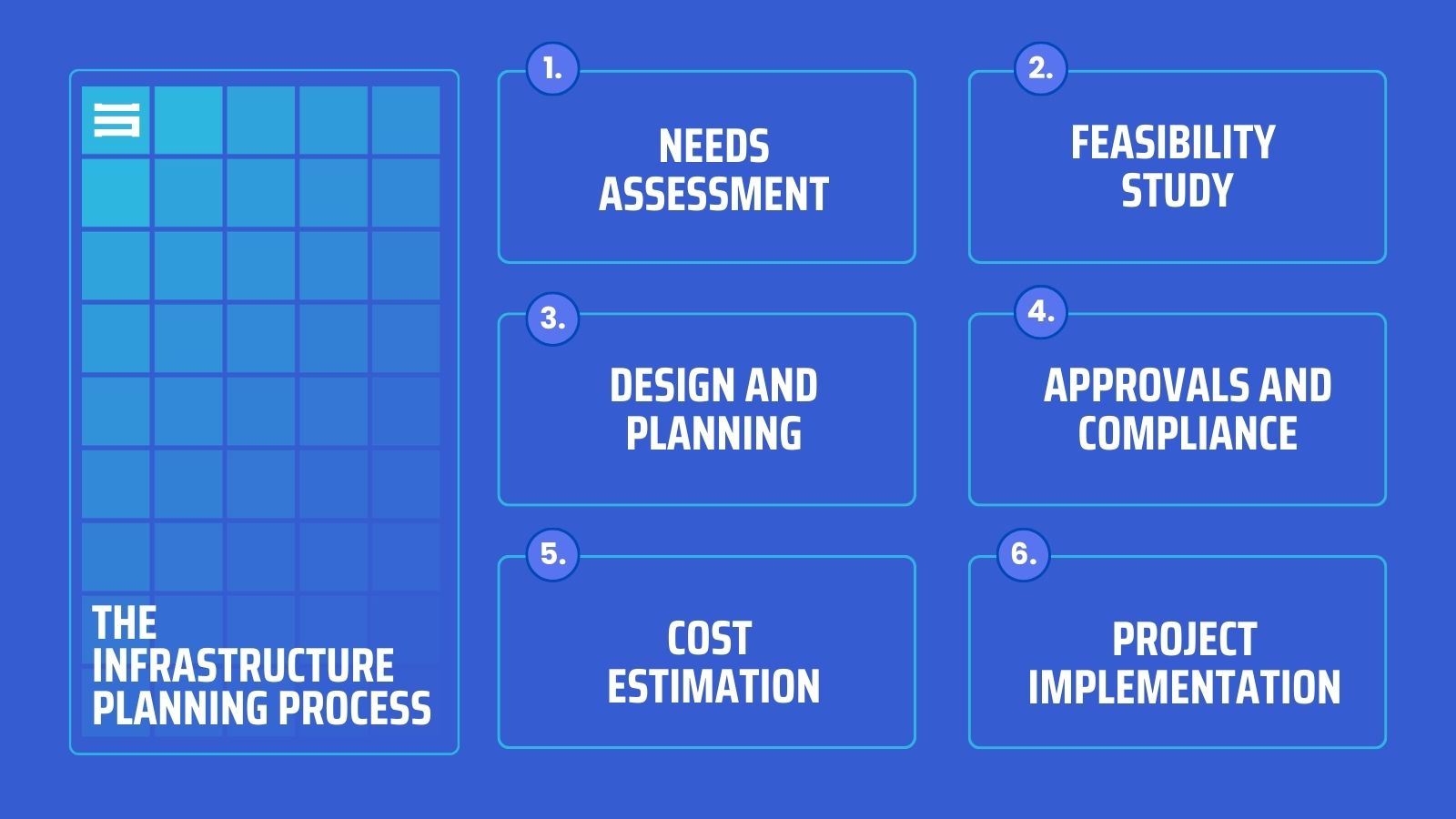
The infrastructure planning process is a systematic framework used to design, develop, and execute major infrastructure projects. It ensures that road construction and infrastructure projects meet timelines, budgets, and quality standards. This process typically involves seven key phases:
-
Needs Assessment: The first step involves identifying the specific needs or problems to be addressed. For example, a city may require new roads to reduce congestion or rail infrastructure to connect growing industrial hubs.
-
Feasibility Study: This stage evaluates whether the proposed infrastructure project is technically, economically, and environmentally viable. Engineers and infrastructure consultants conduct site analysis, assess risks, and predict project costs.
-
Design and Planning: Infrastructure engineers develop initial project designs, blueprints, and models. For road engineering, this may include road alignments, pavement designs, and drainage plans. Modern tools like BIM (Building Information Modelling) improve accuracy and reduce planning errors.
-
Approvals and Compliance: Road and infrastructure engineering consultants ensure the project complies with legal and regulatory standards, such as environmental laws and local authority permissions.
-
Cost Estimation: Infrastructure cost estimation involves preparing a detailed budget that accounts for materials, labour, equipment, and contingencies. Accurate cost estimation ensures financial control throughout the project lifecycle.
-
Implementation: The construction phase begins with the mobilisation of resources and contractors. Proper project management ensures the work aligns with the initial plan.
What is the Role of an Infrastructure Planner?
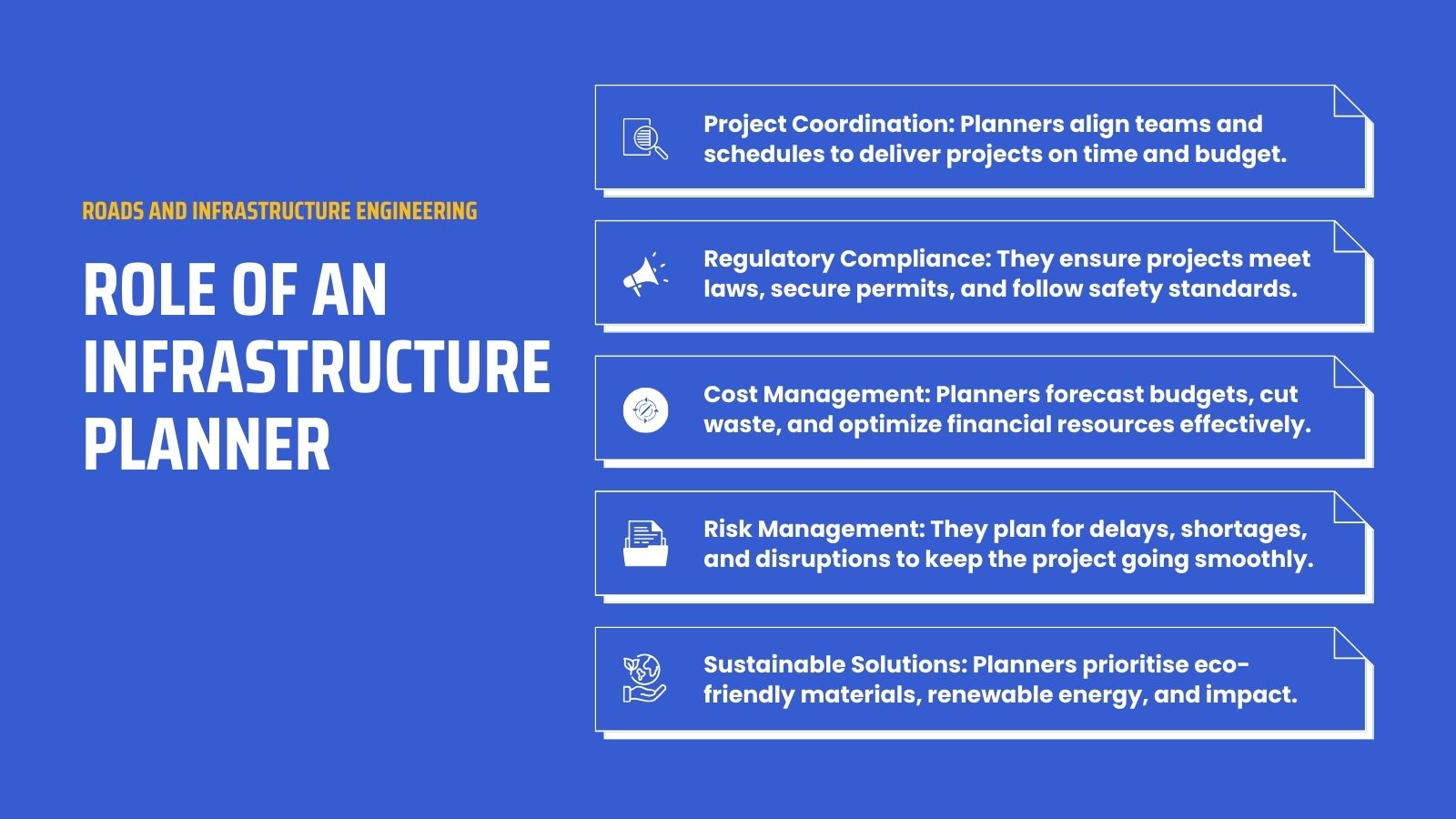
An infrastructure planner is central to the success of construction projects, ensuring that every phase—from concept to execution—meets the required standards. Acting as the orchestrator, the planner balances engineering, cost, environmental, and social considerations.
1. Project Coordination
Infrastructure planners work closely with road design engineers, infrastructure project engineers, and cost consultants. They ensure seamless communication between stakeholders such as clients, construction teams, and government agencies. Their role involves aligning all activities to deliver projects on time and within budget.
2. Regulatory Compliance
Planners ensure that road construction and infrastructure projects adhere to national and regional regulations. This includes environmental standards, zoning requirements, and safety protocols. For projects involving the construction of pipelines or rail networks, obtaining permits and approvals is a critical step.
3. Cost Management
By integrating infrastructure cost estimating techniques, planners help forecast budgets and identify cost-saving opportunities. They work alongside cost consultants to mitigate financial risks and ensure resources are used efficiently.
4. Risk Management
Infrastructure planners anticipate potential challenges—such as material shortages, weather delays, or site issues—and devise strategies to manage them. Their foresight prevents costly disruptions during construction.
5. Sustainable Solutions
Sustainability is a key priority in modern infrastructure planning. Planners evaluate projects’ environmental impacts and incorporate sustainable solutions, such as renewable energy sources or eco-friendly construction materials.
What is Infrastructure Planning and Design?
Infrastructure planning and design involve translating project ideas into detailed blueprints that guide construction. For road and infrastructure engineering projects, this process merges creativity, technical precision, and innovation.
-
Strategic Assessment: Infrastructure planners assess the needs of communities, regions, or industries to determine the most efficient solutions. For road projects, this may involve assessing traffic patterns, population density, and urban development forecasts.
-
Conceptual Design: This phase outlines the basic structure and vision of the project. Road design engineers produce initial drawings that include alignment, cross-sections, and drainage systems.
-
Detailed Design and Modelling: Using advanced software like BIM and CAD, engineers create precise models and plans. For rail infrastructure companies or pipeline construction, this ensures every detail—from track alignment to material selection—is accounted for.
-
Technology Integration: Digital workflows, such as 4D simulations, help visualise the entire project lifecycle, predict challenges, and optimise scheduling.
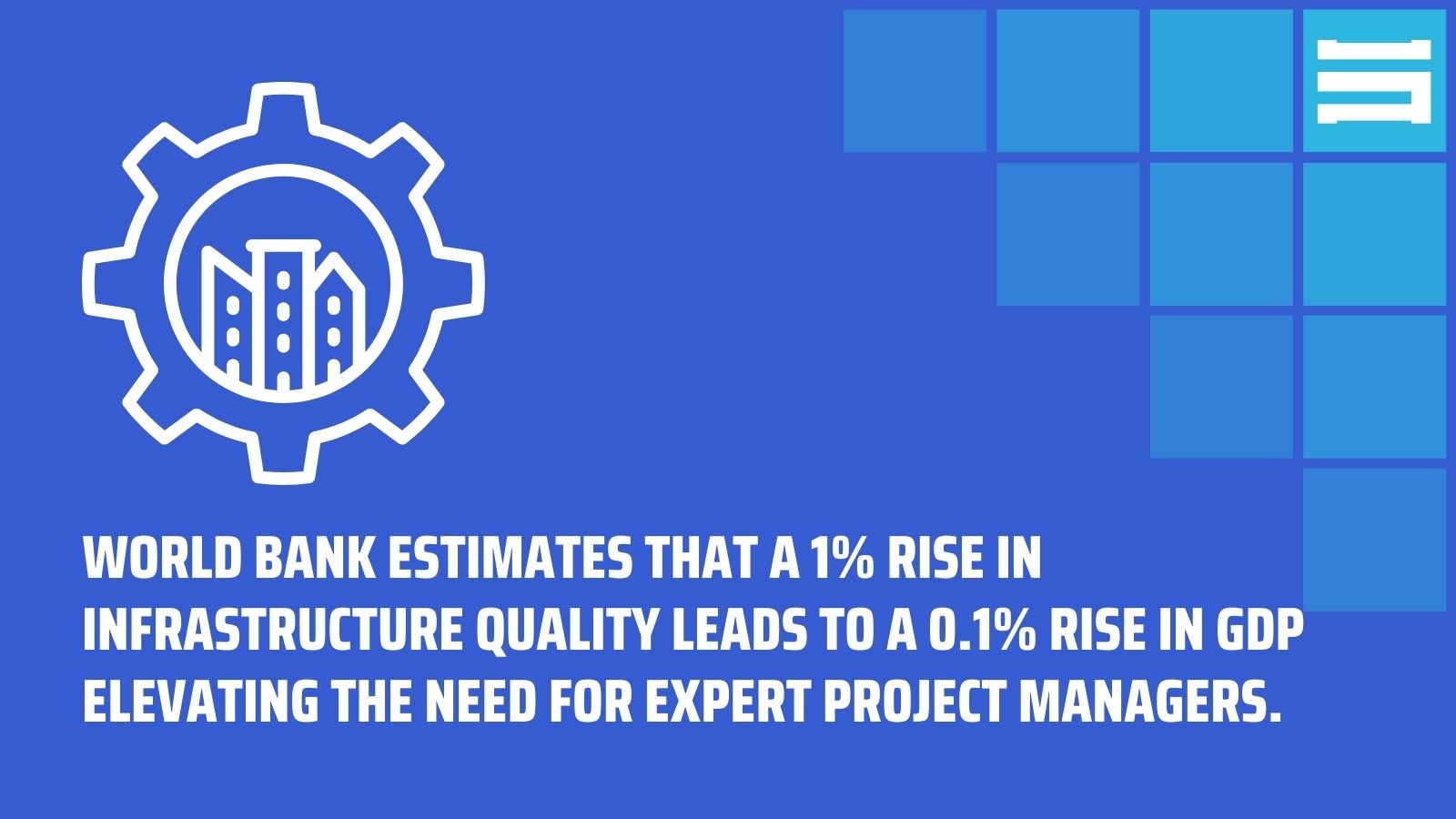
Benefits of Infrastructure Planning
Effective infrastructure planning delivers significant benefits for stakeholders, public users, and the environment:
-
Cost Control: Infrastructure cost examples show that meticulous planning reduces budget overruns and avoids costly rework. Cost consultants play a pivotal role in achieving financial efficiency.
-
Improved Project Timelines: By identifying risks early and planning resources effectively, projects are completed on schedule.
-
Enhanced Safety: Proper planning ensures roads, pipelines, and bridges meet safety standards, reducing accidents and structural failures.
-
Environmental Protection: Sustainable practices, such as eco-friendly materials or energy-efficient designs, reduce the carbon footprint of infrastructure projects.
-
Long-term Resilience: Strategic planning creates infrastructure that withstands extreme weather, heavy usage, and long-term wear and tear.
Infrastructure Cost Estimation by Cost Consultants
Accurate infrastructure cost estimation is a cornerstone for the success of any infrastructure project, particularly in large-scale developments such as road construction, rail systems, and pipeline engineering. For infrastructure construction companies operating in the UAE, effective cost management determines whether a project stays on track or faces delays, budget overruns, and financial strain. This is where cost consultants play an invaluable role, offering critical expertise to manage budgets, anticipate risks, and optimise resources to ensure every dirham (AED) is spent wisely.
1. Budget Preparation and Detailed Cost Breakdown
Cost consultants begin with budget preparation, delivering a comprehensive cost breakdown that provides stakeholders with clarity on projected expenses. This budget includes:
-
Material Costs: Calculating the price of raw materials like concrete, asphalt, steel, and specialised components, based on current UAE market rates. For example, road construction in the UAE may involve estimating large volumes of bitumen and aggregates imported for specific standards.
-
Labour Costs: Accounting for skilled and unskilled workforce expenses, including overtime, subcontractors, and adherence to UAE labour regulations.
-
Equipment Costs: Factoring in expenses for heavy machinery such as excavators, bulldozers, and specialised tools, including rental fees and fuel.
-
Contingency Funds: Allocating a percentage of the budget for unforeseen circumstances like weather delays, additional work, or material price hikes.
Cost consultants ensure the budget aligns with project timelines and goals, providing a clear financial roadmap for construction and infrastructure companies to follow. This level of precision ensures that infrastructure engineers can manage costs effectively, avoiding unnecessary expenditures.
2. Risk Management and Forecasting in the UAE Market
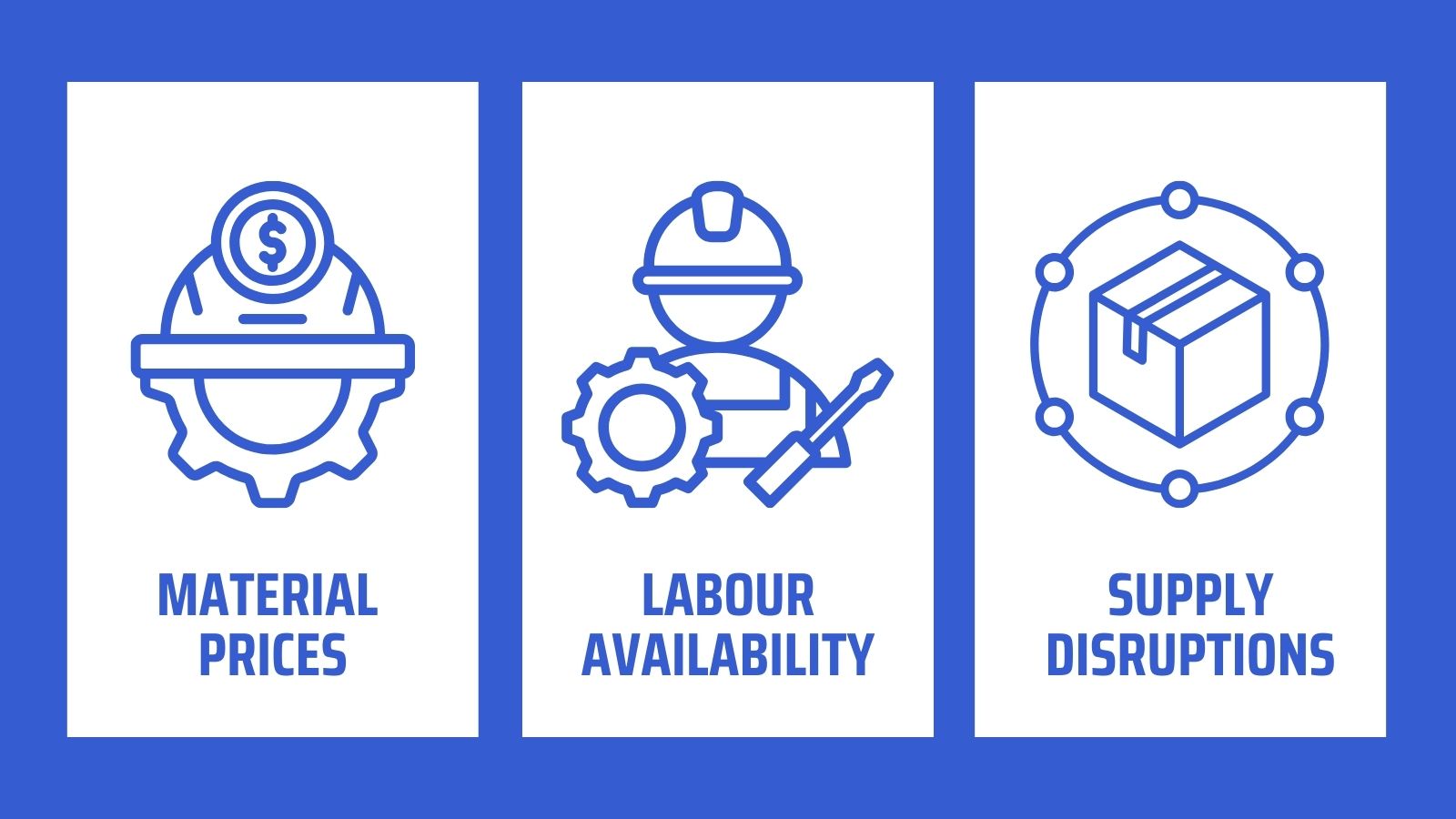
The UAE’s infrastructure sector is dynamic, with factors like global material prices, supply chain challenges, and changing regulations influencing project budgets. Cost consultants perform risk assessments to anticipate these challenges and devise strategies to mitigate financial uncertainties. Key considerations include:
-
Material Price Fluctuations: Given the reliance on imported materials like steel, consultants predict price changes based on global markets and secure procurement strategies.
-
Labour Availability: Assessing workforce requirements and ensuring skilled labour resources align with project schedules to prevent delays.
-
Supply Chain Disruptions: Planning for efficient logistics, especially when transporting construction materials across the UAE or importing through ports like Jebel Ali.
By conducting detailed risk mitigation, cost consultants empower road and infrastructure engineering consultants to plan, reduce financial exposure, and keep projects within budget. For instance, understanding the potential for inflation allows firms to lock in favourable pricing agreements early, saving thousands of dirhams (AED).
3. Value Engineering for Optimised Cost Management
Value engineering is a strategic approach that aims to optimise project costs without compromising functionality, quality, or safety. Cost managers collaborate with road design engineers and infrastructure planners to identify areas for improvement, such as:
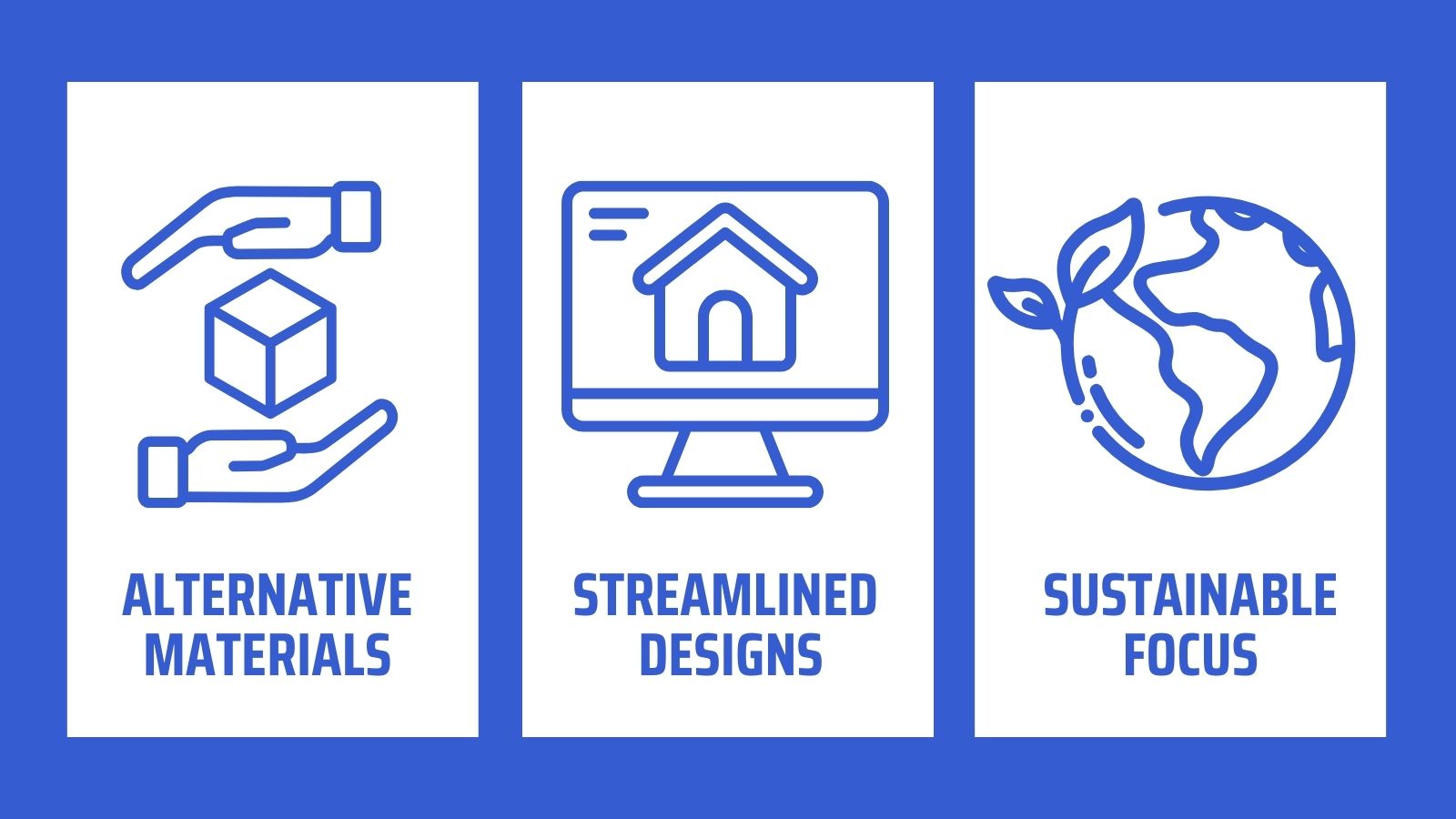
-
Using alternative materials that deliver the same durability and strength at a lower price point. For example, in the UAE, innovative materials like recycled asphalt or modular concrete structures help reduce costs.
-
Streamlined Designs: Refining project blueprints to eliminate inefficiencies and reduce redundant features. This is particularly relevant for road engineering, where optimised alignments reduce material usage.
-
Sustainability Focus: Recommending solutions that are not only cost-effective but also environmentally friendly, such as solar lighting for roads or water-efficient pipeline systems.
For construction and infrastructure companies operating in the UAE, value engineering enhances project cost management by unlocking savings and delivering long-term value. By working smarter, consultants help stakeholders make strategic decisions that optimise every dirham invested.
4. Real-Time Monitoring and Financial Oversight
Cost estimation does not end at the planning stage; it continues throughout the project lifecycle. With the help of modern tools and software, cost consultants provide real-time monitoring to ensure infrastructure projects remain on budget. This includes:
-
Cost Tracking: Infrastructure cost estimating platforms allow stakeholders to monitor actual expenditures against initial projections. For example, road construction companies in the UAE can track fuel costs, labour hours, and material delivery timelines in real time.
-
Change Management: Adjusting budgets as the project evolves, such as addressing scope changes, design modifications, or unexpected site conditions.
-
Transparency and Accountability: Stakeholders, including infrastructure project engineers and clients, have full financial visibility, fostering trust and better decision-making.
By implementing real-time cost tracking, cost consultants help UAE-based firms manage financial resources efficiently, ensuring that budgets remain realistic and deviations are addressed promptly.
5. Cost Management for Diverse Infrastructure Projects
Cost consultants play a pivotal role in delivering successful projects across diverse sectors of infrastructure construction in the UAE, such as:
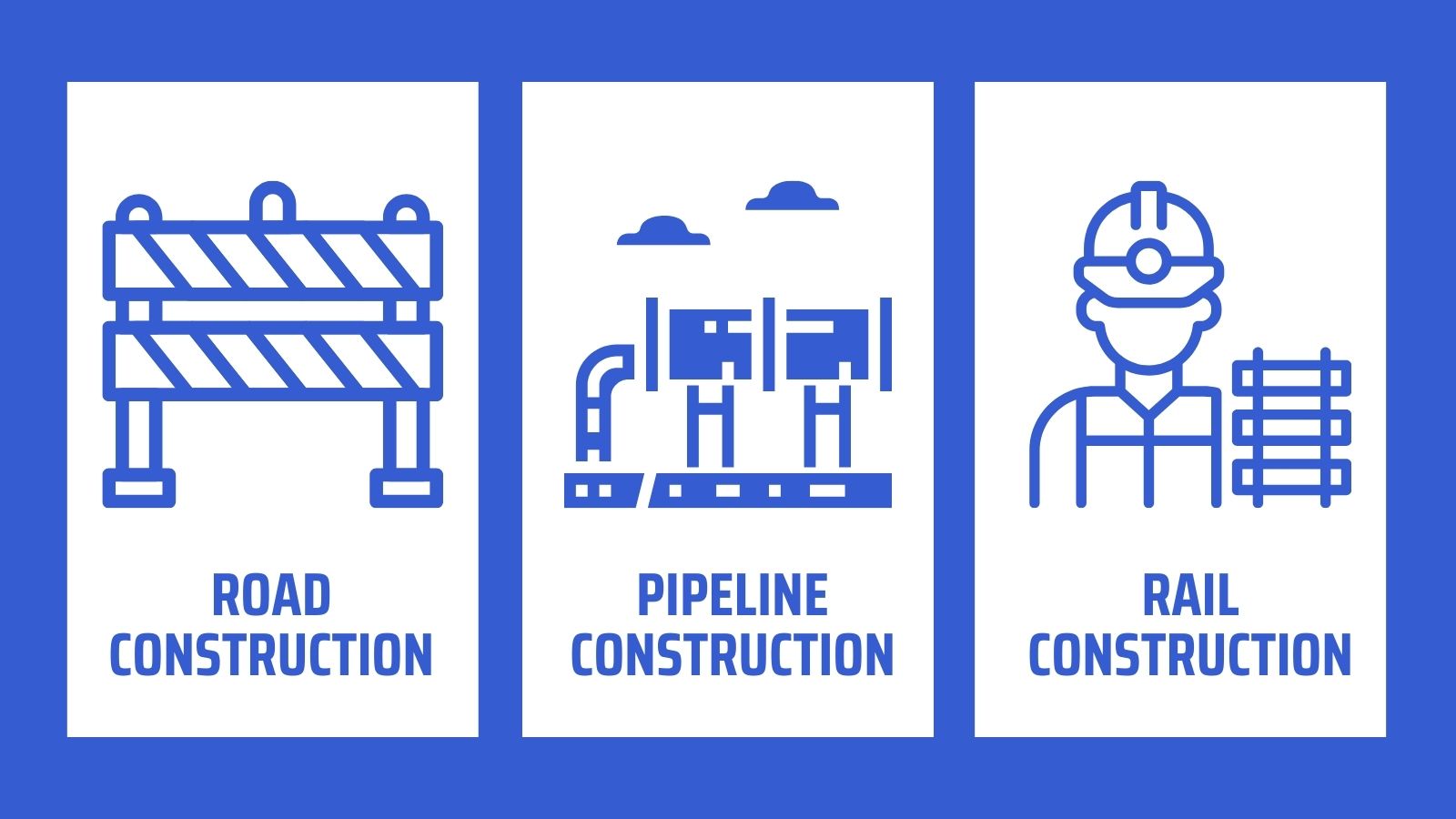
-
Road Construction Companies: Precise infrastructure cost estimating helps control expenses for highways, arterial roads, and urban infrastructure. Consultants ensure compliance with UAE safety standards while keeping costs in check.
-
Pipeline Construction: Whether it’s water supply or energy pipelines, cost consultants evaluate material costs, labour projections, and maintenance needs to deliver economically efficient solutions.
-
Rail Infrastructure Companies: Large-scale rail networks require substantial investments, and cost management ensures financial feasibility, from the design phase to operational implementation.
By tailoring their approach to each project type, cost consultants ensure every dirham (AED) is utilised to deliver maximum impact. Their expertise allows stakeholders to optimise designs, manage risks, and control costs across all stages of development.
6. Leveraging Technology for Infrastructure Cost Estimation
Technological advancements have transformed cost estimation, enabling consultants to produce highly accurate projections and real-time financial insights. Tools that enhance cost management include:
-
Building Information Modelling (BIM): Integrates project design, cost, and scheduling into a unified platform, helping stakeholders visualise and control expenses.
-
Cost Management Software: Automates expense tracking, generates reports, and forecasts financial outcomes with precision.
-
AI-Based Analytics: Predicts risks, material trends, and cost fluctuations, enabling smarter decision-making.
In the UAE’s competitive infrastructure sector, adopting these technologies ensures projects remain on time, on budget, and aligned with client expectations.
Conclusion
Infrastructure construction and planning are vital to the growth and sustainability of modern societies. From roads and railways to pipelines and utilities, well-executed projects connect communities, drive economic growth, and improve quality of life.
For road and infrastructure engineering consultants, success lies in strategic planning, accurate cost estimation, and innovative design. By leveraging technology, adhering to regulations, and prioritising sustainability, infrastructure companies can deliver projects that stand the test of time.
With effective planning processes and expert support, infrastructure projects achieve long-term value, enhancing safety, efficiency, and economic development.
About us
At Stonehaven, we specialise in providing expert roads and infrastructure engineering consultancy services. Our team of experienced infrastructure engineers, planners, and project managers offer tailored solutions to meet your project’s unique requirements.
Whether it’s road design engineering, pipeline construction, or infrastructure cost estimation, we deliver projects that combine innovation, precision, and sustainability. Stonehaven partners with leading clients across the region to create infrastructure that connects people, businesses, and opportunities.
Partner with Stonehaven for your next road and infrastructure engineering project.









